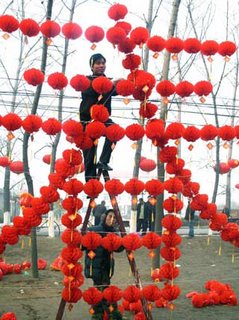
Gong Xi Fa Cai - Chinese New Year 2006 Facts and Tips - Chinese New Year's Do's and Don'ts
* 2006 is the Year of the Dog. 2005 is the Year of the Rooster 2004 is the Year of the Monkey
Chinese calendar has been in continuous use for centuries, which predates the International Calendar (based on the Gregorian Calendar) we use at the present day which goes back only some 425 years. The calendar measures time, from short durations of minutes and hours, to intervals of time measured in months, years and centuries, entirely based on the astronomical observations of the movement of the Sun, Moon and stars.
* When is the Chinese New Year's Day in Year 2006?
January 29, 2006 is the first day of the Chinese new year.
* There are three ways to name a Chinese year:
By an animal (like a mscot). This year is known as the Year of the Dog.There are 12 animal names; so by this system, year names are re-cycled every 12 years.
* By its Formal Name (Stem-Branch).
The new year is the year of bingxu
In the 'Stem-Branch' system, the years are named in 60-year cycles, and the Name of the Year is repeated every 60 years.2006 is the 7th year in the current 60-year cycle.
*It is Year 4703 by Chinese calendar.
Chinese New Year 2006 Do's and Don'ts
Do's
- Wish everyone you meet a happy New Year by saying "Gong Xi Fa Cai," which translates to: "Have a happy and prosperous New Year!"
- Wear articles of red clothing because red symbolizes luck.
- Serve fish (whole including the head and tail) because the pronunciation for fish is the same as the word for surplus.
-Serve dumplings and hide a coin inside. The person who finds the coin wins luck for the new year.
- Buy new clothes, and especially new pants because the Chinese word for pants is "fu," a Chinese homonym for wealth or blessing.
- Children should stay up as late as possible on New Year's Eve for it is believed that the later they stay up, the longer their parents will live.
- Visit family and friends (especially elders) to pass on your wishes of good fortune for the New Year.
- Give children and singles "lai see," red envelopes full of money. Give two lai see to each child, because happiness comes in pairs. This is to pass good luck to the next generation. Business owners also give lai see to employees and associates.
- Post lucky words on the walls, written on red paper. Hang them upside down because the words for upside down and arrive sound the same. "It implies a blessing has arrived or spring has arrived," Jung said.
- Set off fireworks and blow noisemakers.
Don'ts
-Don't wear white or black clothing, since they are the traditional colors of mourning.
-Don't buy new shoes for the first months of the New Year, because the sound of shoe in Chinese is "hai." "Hai" is similar to the sound of sighing, which Chinese believe is not a good way to start the year.
-Don't wash your hair for the first three days of the New Year, because the Chinese word for hair is a homonym for the Chinese word for wealth. Therefore, Chinese believe it isn't a good thing to 'wash away your wealth' right at the start of the New Year.
-Floors may not be swept and garbage may not be disposed of on the first day of the New Year for fear of casting riches out the door.
-Don't swear or quarrel.
-Don't break any dishes, otherwise you may incur more misfortune for the New Year. In the event of breaking a dish, quickly say "Peace for all time," and the bad luck will be warded away.
- Don't greet people who are in mourning.-Don't drop your chopsticks.-Don't say the number 'four' (Chinese homonym for death) or mention death.
-Don't borrow or lend money.
Sources: 4english.cn